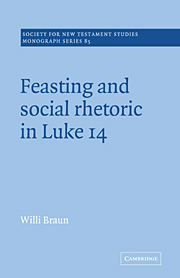Book contents
- Frontmatter
- Contents
- Acknowledgements and note on abbreviations
- 1 Introduction: how to read Luke 14?
- 2 Assumptions and preliminary reading
- 3 Jesus as a healer of craving desire (14.1–6)
- 4 Uncommon ‘symposium rules’ (14.7–11, 12–14)
- 5 The big dinner (14.15–24): aspects of Lukan performance
- 6 The conversion of a wealthy householder
- 7 Forms, genres and composition
- 8 Composition as argumentation: the rhetoric of Luke 14
- 9 Towards closure (and openings)
- Bibliography
- Indices
4 - Uncommon ‘symposium rules’ (14.7–11, 12–14)
Published online by Cambridge University Press: 28 August 2009
- Frontmatter
- Contents
- Acknowledgements and note on abbreviations
- 1 Introduction: how to read Luke 14?
- 2 Assumptions and preliminary reading
- 3 Jesus as a healer of craving desire (14.1–6)
- 4 Uncommon ‘symposium rules’ (14.7–11, 12–14)
- 5 The big dinner (14.15–24): aspects of Lukan performance
- 6 The conversion of a wealthy householder
- 7 Forms, genres and composition
- 8 Composition as argumentation: the rhetoric of Luke 14
- 9 Towards closure (and openings)
- Bibliography
- Indices
Summary
The instructions on reclining places (14.7–11) and on whom to invite to a social dining affair (14.12–14) immediately draw attention to themselves by their symmetrically parallel construction (see the figure in ch. 2, n. 30). This parallelism extends beyond literary structure. Both panels almost banally evoke taken-for-granted customs and values that governed the properly conducted deipnon or symposion in the Mediterranean world of Luke's time. Both panels make reference to reigning symposium rules (Ʋóμοι σνμποτικοί only to deny them and to supplant them with rules rooted in a different sympotic ethos. Finally, the rejection-replacement pattern is supported in each case with a rationale (ὅτι), once in the form of a maxim (14.11), then in that of a macarism (14.14). Formal similarity, topical affinity and commonality in moral outlook allow me to treat these twin instructional panels together in a single chapter.
Promotion and demotion (14.7–11)
Luke 14.7–11 consists of three distinct elements: a transitional introduction (14.7), the saying on first and last places at a wedding meal (14.8–10), an appended rationale in the form of a saying on the reversal of the lowly and exalted (14.11).
14.7 is an editorial link that connects the following saying with the preceding chreia. In this verse Luke describes the saying on seating arrangements as a παραβολή, but this has influenced few modern form critics.
- Type
- Chapter
- Information
- Feasting and Social Rhetoric in Luke 14 , pp. 43 - 61Publisher: Cambridge University PressPrint publication year: 1995



